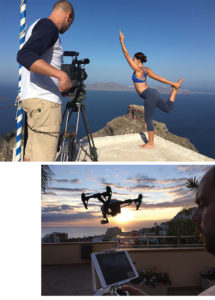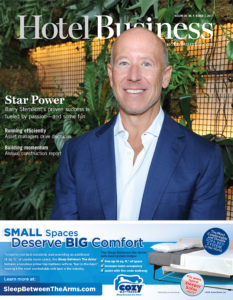LONDON—In the hospitality business, David Beasley says the name of the game is to convert a “looker into a booker.” As founder of VIP Worldwide, a boutique luxury hospitality film and marketing agency, his business is focused on helping hotels and resorts leverage the visual medium to reach and engage audiences and, ultimately, turn those viewers into buyers. Through his work with clients, Beasley realized there was a better way to deliver information about a property that would be immersive, memorable and impactful. Toward that effort, he invested in virtual reality (VR) technology with embedded features to encourage conversions.
“Initially, we were a film and video production company. We pitched and did promotional videos for hotels. It became apparent to me and my team when we would be on-property at these luxury resorts around the world, it seemed the marketing efforts were old- fashioned in many respects. They had a traditional spend for web advertising and a lot of money was spent on agents because they needed to live it, see it and taste it while there,” said Beasley. “I thought ‘nothing beats being there.’ If we are able to make films that could represent a property instantly, surely that would be a great way forward.”
Virtual reality is not just for gamers, and it’s gradually becoming more important in the hospitality sector as brands such as Best Western Hotels & Resorts, IHG, Shangri-La Hotels and Resorts and St Giles Hotels have entered the VR arena. Marketers are also beginning to see real value in VR as an effective implementation tool to reach the masses in a novel way, as well as raise awareness and increase engagement for a hotel or resort. Beasley’s rationale for VR is clear and simple: “The more engagement, the more likely there will be a booking,” he said.
Rather than create a promotional film, VIP Worldwide took a different tack in terms of providing the visual information potential guests needed to digest before making the decision to book. They made a series of individual videos for their clients, which included a short clip of each of the room categories, the spa, cuisine and any other features of the property with embedded links along the way. Beasley’s initial hunch on boosting engagement proved effective and eventually developed into a new avenue of business for VIP Worldwide.
“We made beautiful films that were exactly the length they needed to be without boring people. On average, we experienced that when someone would watch one video, it would lead to them watching at least seven videos,” said Beasley. “They weren’t the standard length, but long enough for anybody to know what the room looks like. People were on the website longer and the longer they would stay, the more likely they were to book. We constantly improved what we are doing and that was the core of what we started to do.”

VIP Worldwide produces content that gives a bird’s eye view of a property, fostering a connection with guests. Using 4K cinematography technology, digital storytelling aims to engage and influence viewers, while helping to facilitate increased bookings and revenue for luxury hotels and resorts.
This venture into VR wasn’t a complete slam dunk at first. Beasley had to win over doubters and showcase this technology-forward tool as a viable marketing method for his clients. He also keyed in on the subtle nuances of marketing to this audience.
“People didn’t truly understand the power of video and we’ve been working with the most beautiful hotels in the world delivering content that is practical and visually stimulating,” he said. “You don’t want to overproduce every single room category or it will come across as advertising. People don’t want to be sold to, they want to buy. We have armed hotels with enough information so they have all the tools they want.”
Another challenge Beasley encountered were concerns that housing these videos on their websites would slow down the booking process and along with it, their servers. A problem-solver by nature, he and his team developed video players and enabled the clips to play in a window on the clients’ websites, while being hosted on the servers at VIP Worldwide.
“It gave us sophisticated data as a result. We could look at their viewing patterns and behaviors and how they would share things even when they were on-property,” he said. “They were using social media, while sitting on a lounger and sharing things like ‘this is where we play golf’ with their friends, who are looking at the videos on the social sites that link back. It was growing for us.”
As more opportunities unfolded organically, he seized them and made them a part of the company’s repertoire. Social media and digital marketing were soon added to the mix.
“We help clients with social media to predict the best times to promote films via Twitter, Instagram, Facebook, etc. From there—because we’ve built a lot of intelligence—we opened up an expanded business model to include social and digital marketing. We have a social media team who makes use of video-rich content because of its sharability and ranking with Google. Google loves video and it’s a great SEO tool.”
VIP Worldwide is keeping its eyes set on tools that will meet the needs of its clients. Instead of starting from the ground up with VR, Beasley reached out to a start-up to build the VR application based on the knowledge VIP Worldwide captured to sell rooms.
“We use the same technique and ideas as traditional filming with VR, so it doesn’t become about technology over quality, style and impact. There’s a lot of technology out there. Just because it’s really clever doesn’t mean it’s going to translate to bookings,” he said.
“I remember talking to hoteliers 15 years ago and hearing them say they’d never go on a website because they have brochures and people to market their properties. All we’re doing now is providing tools to stimulate attention and be available at various touchpoints where 99% of the people in the world, who go on holiday, will be searching. It’s our job to get clients found in the most informative way.” HB

